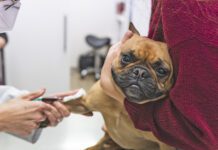MYTH: Adult dogs don’t get parvo.
TRUTH: It’s true that the likelihood of a serious parvo infection decreases as dogs age, and that most victims are puppies. But adult dogs can become seriously ill or die from parvo.
MYTH: I can protect my dogs from exposure to parvo by maintaining a clean environment and restricting their contact with other dogs.
TRUTH: The virus is everywhere, and it’s impossible to prevent exposure.
MYTH: My dog is strong and healthy. His immune system will prevent him from getting sick.
TRUTH: Under the right conditions, any dog can be vulnerable to illness.
MYTH: Vaccinations will protect my puppy.
TRUTH: Vaccinated puppies can get parvo under certain circumstances.
First, not all puppies have an appropriate immune response to vaccines. It’s rare, but it does happen, that some dogs must be vaccinated numerous times before their immune systems respond by manufacturing protective antibodies.
More common is something called maternal antibody interference. As long as they are active in a puppy’s body, the antibodies received from a protected mother both guard the puppy from infection and prevent vaccines from working properly. These maternal antibodies begin to fade from the puppy’s system anywhere from 6 to 16 weeks following birth.
In order to protect puppies as soon as possible after the maternal antibodies wane, they are generally vaccinated for the first time around 6-8 weeks of age, and then given additional vaccinations every 2 – 4 weeks, until they are around 16 weeks old. But if they’re exposed to parvovirus at any point between the fading of the maternal antibodies and the advent of an immune response to vaccination, they can become infected.




